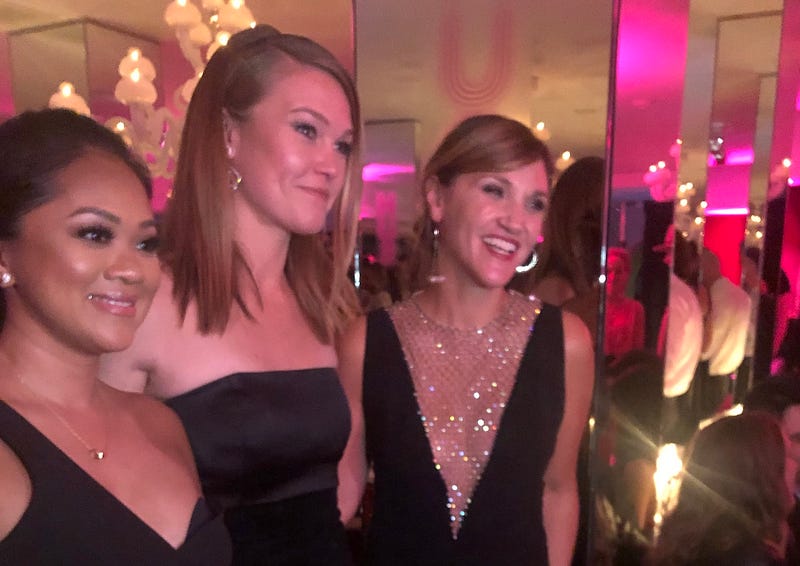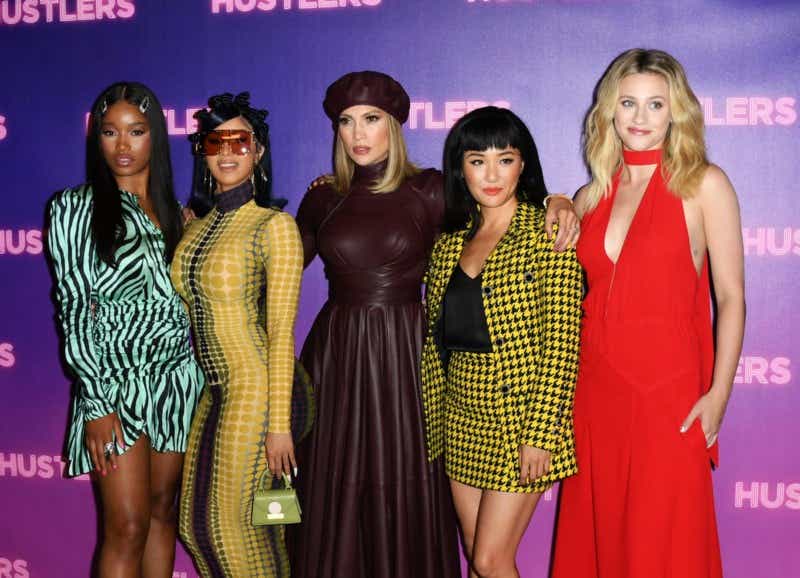New York magazine writer Jessica Pressler shares behind-the-scenes scoop on the film based on her reporting
The new film “Hustlers” is getting a ton of buzz — and not only because it stars Jennifer Lopez, Cardi B, Constance Wu and other amazing women. The movie, about a group of New York City strippers who rob wealthy Wall Street men, is based on an article that everyone’s been talking about for four years now: “The Hustlers at Scores,” a 2015 report by New York magazine writer Jessica Pressler. With the film now in theaters, we caught up with Jessica to get the scoop on her reporting process and what it’s like being portrayed on film. (In her instance, Julia Stiles plays a journalist based on Jessica.) Read on.
Katie Couric: How did you first hear about this story? What made you want to pursue it?
Jessica Pressler: I first heard about this story when my husband was getting his shoes shined and read in the Daily News that a stipper crime ring was charged with doing all of this. I had previously done a story about another woman who had worked at Scores, which was the club mentioned in the Daily News article. She had told me about the dynamic in the club and how it had warped their perception of men. It seemed to me that this was a natural outgrowth of having that attitude. I was interested in finding out more about that and more about who the women were.
We’re so interested to know more about your reporting process. How long did it take you to report the piece, and how cooperative were Rosie (played in the film by Constance Wu) and the other women in speaking with you?
It took a really long time. I started probably in the fall of 2014 and nobody wanted to talk to me because it was an open court case. But I was really interested and persistent and wanted to get to know these people, so I kept going back to court when they were there. I worked on other things during that time. Months went by and eventually I was at court one day and somebody said that Rosie took a plea deal. I drove out to Rosie’s house in Rockland County, New York, and I brought cannolis because I was like, “I don’t want to be impolite. I will show up with baked goods.” She wasn’t home, and I left her a note. But as I was driving away, she called me and said that I could come back.
I went back and we talked for a pretty long time. Her plea deal hadn’t gone through yet, and the wheels of justice turn very slowly. We had many, many conversations but we were always waiting for the case to be adjudicated before I ran this story. It was taking forever and ever. A full year went by, and I was getting pressure from my editors to do the story. So I asked Rosie if it would be okay if we ran it a little earlier, and she was very down with that. She called her lawyer during the fact checking, and her lawyer really scared her. So that’s when she pulled her Almost Famous moment at the end of the story — when she tells the fact checker that she made the whole thing up.
After that, we pulled the story for a while because I didn’t actually want to be responsible for her getting in more trouble. More time went on, and I started talking to more of the girls. I met one of the victims and he told me his story. Ultimately it took almost two years.
When the movie was optioned, did you know it was going to be on such a huge scale with people like JLo and Cardi B involved?
The first thing everybody says to you when you get something optioned is “Congratulations.” The second thing is “Oh, it will never get made.” That is the expectation, but I felt that this would get made. It was a culturally relevant story. Me Too hadn’t happened yet, but all the feelings and frustrations that led up to it were happening. It was almost cathartic to see these women act out against it.
But it took a long amount of time to gather the cast. I wasn’t privy to the actual production process, but I heard bits and pieces. Lorene Scafaria, the writer and director, and Jessica Elbaum, the producer who optioned it, were very dedicated and passionate and wanted to get it done. They saw it the way I did. At our first meeting, Lorene said, “I think Jennifer Lopez is the Ramona character.” Once she signed on, everybody else was just all in. That’s the star power of JLo.
As the writer of the original article, what was your involvement in the film?
I wasn’t involved in the film. I had a lot of meetings with Lorene and gave her notes — some that she asked for and some that she didn’t, like sending her emails at 3 a.m. like, “I think we should use ‘Hit ’Em Up Style’ in this sequence.”

We love that Julia Stiles plays a character inspired by you. How did this happen, and what is it like seeing yourself portrayed on screen by a well known actress?
It’s funny — my editor was like, “You now know your answer to the question of who will play you in a movie, which is cool.” She plays a journalist named Elizabeth. I don’t know if Lorene did this on purpose, but that’s the name of the other Sweet Valley High twin. And she is more like an Elizabeth than a Jessica, in that she is a little bit more buttoned-up. She’s Julia Stiles — she has an Ivy League education. Julia came to my house, asked me questions and wanted to know about the reporting process and if I used a recorder or took notes. She did incorporate those things, so there is a little bit of me in that character. But she has a much nicer apartment than I have.
What do you hope people take away from this film?
At the end of the day, this is a story about a women who drug men and rob them. That’s why it was a bit of a hard sell. I think the takeaway is that they did a bad thing, but they aren’t bad people. They were ordinary people who got sucked into a situation, who were in certain circumstances and got caught up in their circumstances, and things got out of control. That, to me, is a relatable situation.
This interview has been edited and condensed.
This originally appeared on Medium.com









